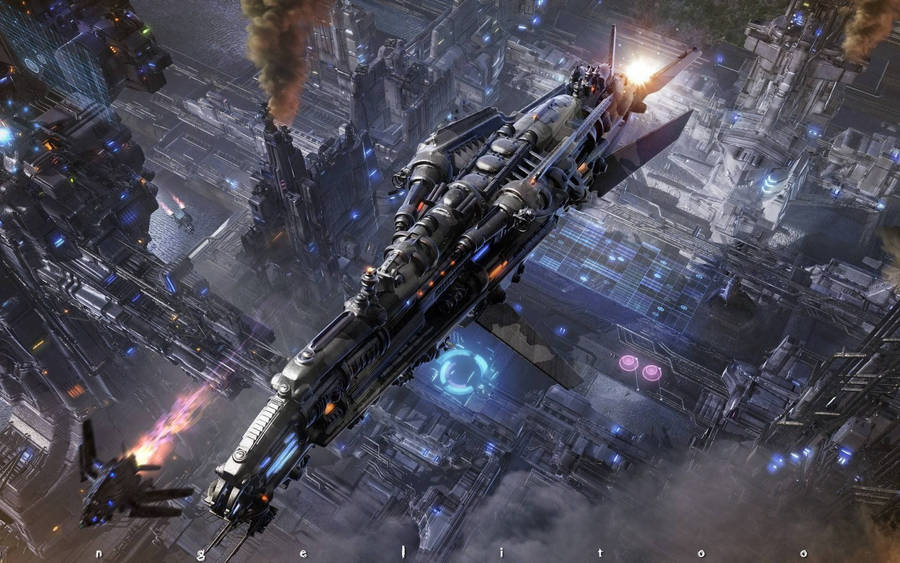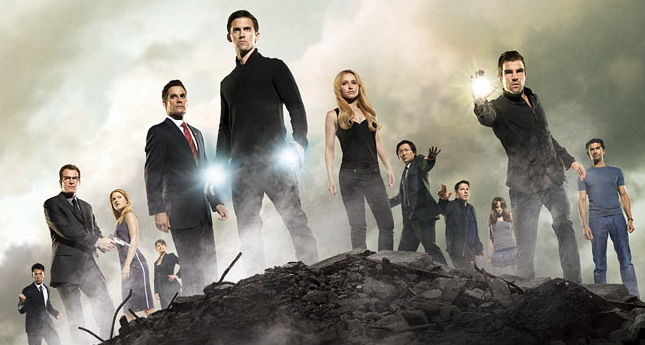
Save the cheerleader. Save the world.
Let's cut to the chase: if you've seen a preview, or are otherwise curious about Heroes, just watch it. The less you know going in, the more enjoyable the series is likely to be. Although it's not a perfect show, the mix of sincerity, humor, excellent acting, and compelling story place it in the top tier of current television offerings.
First things first, Heroes is a great show, deserving of the hype and positive word-of-mouth and packed silly with interesting characters and paced masterfully. Creator Tim Kring has developed a series that should serve as a case study on how to plot a season-long serial; at many points throughout my viewing I was dumbfounded at the mechanics of the character arcs and intersections. Not many shows can balance multiple storylines, but the folks behind Heroes put on a clinic.The first thing that stands out about Heroes is the compelling premise. Tying together current trends in genetic research with superhuman abilities (plus the odd conspiracy theory), the first episode begins in the middle of the story, and half the fun of this season is putting all the pieces together. Another plus for the story is the use of real people as the "heroes." Instead of the too-perfect Superman, or the morally ambiguous Batman figures, we get normal people, like a cheerleader or a beat cop, who become gifted (cursed?) with new powers. It's been done before, but the sheer, continent-spanning scope of the hero characters in the series is staggering.
Well, this is going to be a tough synopsis. Heroes is about as serialized as any other hour-long on television, and its storyline(s) is driven by the twists, reveals and changes in character. Basically, don't expect much detail because almost anything specific I say will be spoilerish, and that would be cruel.
The vague overview is that (seemingly) random, everyday people are discovering they can wield superhuman abilities. Flight, regeneration, telekinesis, super-hearing, phasing, brute strength, time travel and more await the characters in the Heroes universe. Some of the major players include hospice nurse Peter and his brother, the congressman-to-be Nathan Petrelli, cheerleader Claire and her mysterious father Mr. Bennet, spunky Japanese office worker Hiro, LA cop Matt Parkman, Niki the Internet stripper, researcher Mohinder Suresh and the malicious Sylar.
Each of these individuals' destinies will intersect at some point, as they discover the roles they play in a common mission to save the world.
As I did in the synopsis, I'm going to keep this wrap-up as spoiler-free as possible. I was lucky enough to dodge any and all plot points during my wait my sister to share her DVD copy of it and my viewing experience was that much more rewarding. If you're a Heroes newbie, I urge you to steer clear as well; the show thrives on its big reveals and jaw-dropper cliffhangers.
Fate and destiny. That's what Season One is all about. Is the future written? Can it be chanced free, willing agents? Or is agent freedom a façade? Are humans governed strictly by the unfeeling mechanical processes of evolution? Or does God play a role still? These questions are tossed around liberally throughout the 23 episodes, and despite the monologues and voice-over narration, there are no real answers given. Truly these characters are connected, and their arcs will inexorably meet, but what governs that? What is the driving force? While some of these philosophical rhetorical questions flirt with pretentiousness, they give the show a weightier feel that elevates beyond being a simple comic book TV show.
But Heroes is a great comic book show and its storytelling embraces that comparison. While obviously derivative of the X-Men mythos (humans genetically mutating into supe rior beings, a shadowy government organization fearfully pursuing them, bad folks with super abilities out to cause havoc), the show still feels fresh and original. Plus, the writers are self-aware enough to stock plenty of fanboy "in" jokes, like nods to Star Trek (capped with a recurring role by George Takei), Back to the Future and its comic book influences (references to popular superheroes and a cameo by Stan Lee). This treatment gives Heroes more of an homage feel, but Kring and his crew spin enough of their own mythology to make the enterprise unique and the characters grounded.
rior beings, a shadowy government organization fearfully pursuing them, bad folks with super abilities out to cause havoc), the show still feels fresh and original. Plus, the writers are self-aware enough to stock plenty of fanboy "in" jokes, like nods to Star Trek (capped with a recurring role by George Takei), Back to the Future and its comic book influences (references to popular superheroes and a cameo by Stan Lee). This treatment gives Heroes more of an homage feel, but Kring and his crew spin enough of their own mythology to make the enterprise unique and the characters grounded.
As much as I enjoyed the show, however, there are still some warts. As I mentioned before, the opening voice-over lends gravity to the show, yet it also came across as heavy-handed and empty, like the writers wanted to make their show sound a lot more academic than it is. When you're juggling so many plotlines, you have to expect a few of them to fall on the ground and shatter, and Heroes has its share of narrative missteps, like a pointless and contrived samurai sword training montage, an unsatisfying love triangle and some spotty characterizations.
(SPOILER ALERT! Seriously, being complicit in the vaporization of a million people? How is anything worth that?).
But those are nitpicky. What's not nitpicky is the oft-maligned finale. While the final episode isn't a train-wreck, I found it unsatisfying. For a show that is, in essence, all build-up, there is a heavy responsibility on the finale to serve up something unforgettable and Tim Kring only managed to cap his stellar debut season with a mediocre episode. Again, not to tread too far into spoiler territory, but there had been a showdown brewing nearly all-season long and when it finally happened—pbbbbbbttttttt. Just undelivered. Even the big cliffhanger finale failed to marshal anticipation for next season. It's a bummer because this disappointment—it's probably the least-rewarding episode of the entire run, which, to be fair, speaks more to the excellent quality of the rest of the shows—left a bitter taste in my mouth.
You want plot holes? We got plot holes. Any story about time travel has to try to deal with the whole "para dox" thing, and Heroes sets up paradoxes galore. Like, if the heroes save the day, then "Future Hiro's" world would cease to exist. And if that were the case, how could "Future Hiro" ever come back and give a message to the heroes for them to saving the day? Isaac, meanwhile, paints what he sees in the future. But a lot of what he paints only comes true after people see the paintings and act on them. Does that mean his paintings are altering the future somehow? If he chose not to paint, would what he see when he paints not come to pass? I'm sure people smarter than me can come up with even better examples.
dox" thing, and Heroes sets up paradoxes galore. Like, if the heroes save the day, then "Future Hiro's" world would cease to exist. And if that were the case, how could "Future Hiro" ever come back and give a message to the heroes for them to saving the day? Isaac, meanwhile, paints what he sees in the future. But a lot of what he paints only comes true after people see the paintings and act on them. Does that mean his paintings are altering the future somehow? If he chose not to paint, would what he see when he paints not come to pass? I'm sure people smarter than me can come up with even better examples.
A lot of the "mechanics" of the heroes' powers are suspect as well. Like, Claire's weak spot might be her brain, but wouldn't her brain have been irradiated at the end of "Company Man," killing her permanently? As Peter gets more and more powerful as the season progresses, there are plenty of opportunities to ask, "Why doesn't he just use [name of super-power] to get himself out of this situation?"
Even considering my (ardent) displeasure with the season finale and a fair share of plot holes, Heroes provides some stunningly epic television filled with interesting characters, great acting, and a story that offers lots of opportunity for viewer investment.Labels: Show Review

0 comments:
Post a Comment